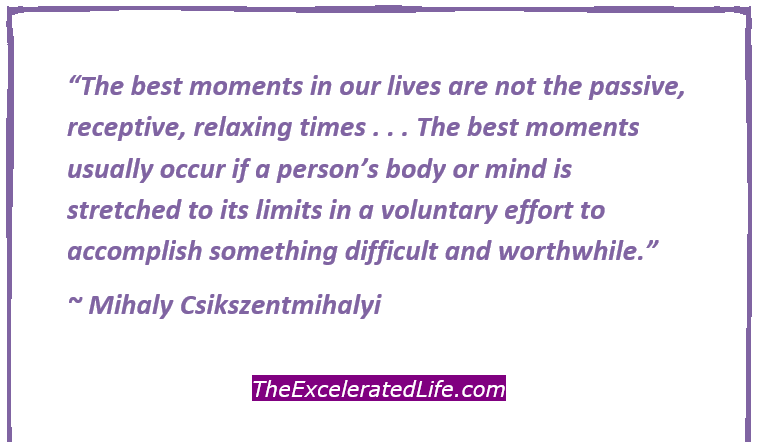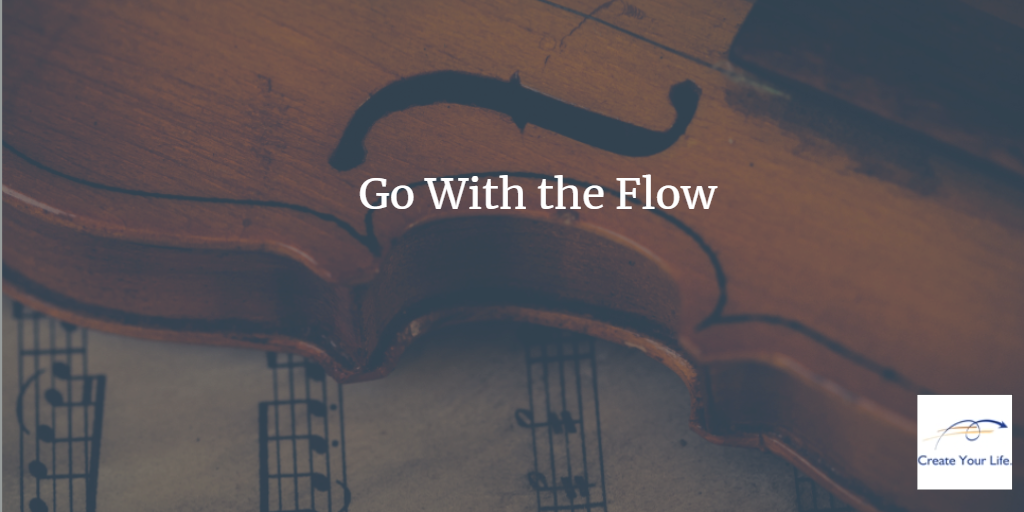“Of all the virtues we can learn no trait is more useful, more essential for survival, and more likely to improve the quality of life than the ability to transform adversity into an enjoyable challenge.”
~ Mihaly Csikszentmihalyi

Flow-ing
Have you ever been so engrossed in an activity that time seemed to stand still for you so that you were surprised, maybe even shocked, when you finally glanced at a clock and realized how much time had passed? When you were so interested that your “inner voice” became quiet as you concentrated fully on the activity you were enjoying? And you “lost yourself” as you became completely immersed in what you were doing? In those moments, you were in “flow”.
Mihaly Csikszentmihaly (pronounced “me-high cheeks sent me high”) has dedicated his professional life in a “quest to discover scientifically the key to human beings at their best” [Seligman]. This is in general a fundamental principle of Positive Psychology. In fact, Csikszentmihaly is one of the seminal thinkers who developed the concepts that grew into Positive Psychology. Csikszentmihaly is the mastermind behind the concept of flow. He has devoted his career to studying what flow is, how we achieve a flow experience, and why we’d want to.
What Is Flow?
So, what exactly is “flow”?
The term itself was selected Csikszentmihalyi tells us “because this is the term many of the people we interviewed had used in their descriptions of how it felt to be in top form: ‘It was like floating,’ ‘I was carried on by the flow.'” [— from Flow – Mihaly Csikszentmihalyi]
A flow experience occurs when you are fully engaged in an activity. You give all your attention to the task at hand. You lose your sense of self and are unaware of the passage of time. [— from Good Business – Mihaly Csikszentmihalyi]
Flow has several distinct characteristics.
- The task is challenging but not impossibly difficult. There are clear rules about how to perform.
- Action and awareness merge. You are completely focused on the task at hand with no outside stimuli or disruptions.
- You lose your sense of self, becoming completely immersed in the activity.
- You feel fully in control of your actions.
- You receive clear and immediate feedback on your actions.
- You find the activity autotelic, rewarding in and of itself. Doing the activity is its own reward.
Why Be In Flow?
Activities that bring flow improve positive feelings and well-being. Note that these activities are not necessarily “fun” or “easy”. Think of competing in a Wimbledon tennis match or a chess championship.
“Clearly, people are motivated to pursue these activities because they derive some satisfaction from them,” Csikszentmihalyi writes, “and this satisfaction itself acts as a reward.” [— from Beyond Bordem And Anxiety – Mihaly Csikszentmihalyi] These are autotelic activities, rewarding in and of themselves.
When you are involved in an autotelic (for you) activity, you experience a sense of oneness, of wholeness. You are so engaged, you lose track of time as one minute flows into another. The activity is challenging but not too difficult. You are in control of your actions but also feel as if the actions are happening on their own. You experience “little difference between yourself and the environment, between stimulus and response, and between the past, present, and future.” [— from Beyond Bordem And Anxiety – Mihaly Csikszentmihalyi]
How Do I Get There?
To practice getting into flow, first recall the characteristics of a flow experience: the task is challenging but not too difficult; you become completely immersed in the activity; action merges with awareness; you feel fully in control of your actions; you get immediate feedback or results; doing the activity is its own reward.
Let’s take a closer look at some of these.
“In all the activities people in our study reported engaging in, enjoyment comes at a very specific point: whenever the opportunities for action perceived by the individual are equal to his or her capabilities.” [— from Flow – Mihaly Csikszentmihalyi]
Too hard? No flow. Too easy? No flow. But when the activity matches our skills, maybe stretching us just a little, we get to flow.
A flow activity compels your complete attention. If your attention wanders, even for an enjoyable activity, you’re not in flow. But if the activity is truly rewarding by itself, you give it your full attention; in fact, you may “lose yourself” and not be conscious of any “thinking” at all. Consider the parent reading to his or her child when both are engrossed in the story.
Look for activities where you make decisions, take actions, and get immediate feedback or results. Think about the chess player, the tennis champion, or someone engaged in a physical challenge, such as rock climbing. An artist. A golfer. An accountant balancing the books. They know right away if their actions are effective or not.
Almost any activity can become a flow activity, given some thought and preparation and the proper conditions. It’s the difference between an intrinsic goal or intrinsic motivation, where we do something because we find the activity itself rewarding, and the extrinsic goal or motivation, where we feel compelled by outside forces to pursue a goal or task.
Of course, knowing about flow is not the same as participating in activities that bring flow. As Mihaly Csikszentmihalyi tells us: “It is not enough to know how to do it; one must do it, consistently, in the same way as athletes or musicians must keep practicing what they know in theory.” [— from Flow – Mihaly Csikszentmihalyi]
What If I’m Not In Flow?
“Thus we have a paradoxical situation: On the job people feel skillful and challenged, and therefore feel more happy, strong, creative, and satisfied. In their free time people feel that there is generally not much to do and their skills are not being used, and therefore they tend to feel more sad, weak, dull, and dissatisfied. Yet they would like to work less and spend more time in leisure.” [— from Flow – Mihaly Csikszentmihalyi]
According to Csikszentmihalyi, we may find it easier to get into a flow state working at our job than in our free time. If you’re looking to bring more flow to leisure activities, consider these ideas.
Too hard? Too easy? How can you adapt or change the activity? If it’s too easy, think of ways to make it more challenging. If too hard, take a smaller step.
Try different activities. How can you expand your horizons? Csikszentmihalyi states that some people report flow from a transcendental or religious experience. [— from Beyond Bordem And Anxiety – Mihaly Csikszentmihalyi] Learn a new skill, such as playing a musical instrument, or learn a new language. Consider your Signature Strengths and look at activities to use one or more of these special abilities.
Where Do I Go From Here?
“Of all the virtues we can learn no trait is more useful, more essential for survival, and more likely to improve the quality of life than the ability to transform adversity into an enjoyable challenge.” [— from Flow – Mihaly Csikszentmihalyi]
Look at your BIG (Bold-Important-Gratifying) goal and your progress or lack of it. If it truly is a BIG goal, you are likely facing some challenges. They may seem insurmountable. Step back a moment and look for ways to make the challenge enjoyable.
Recall the elements of a flow experience. Are you trying to do something that’s too hard . . . outside your current capability? How could you make it easier? For example, don’t try to run 5 miles if you are a recovering couch potato. First, walk around the block. As you get comfortable doing that, add more distance. Gradually switch from walking to running.
How could you make the pursuit of your goal autotelic . . . rewarding in and of itself? Hopefully, your BIG goal comes from intrinsic motivation – something you want to do or achieve, and not something you selected because it’ll look good, or everyone else is doing it, or society says you should. If it isn’t an intrinsic goal, maybe you should reexamine it.
How can you limit distractions when you are working on your goal, such that you can be completely focused on the task at hand?
Can you craft the tasks such that you get immediate feedback or results? If you’re focused on an outcome goal, break it down into smaller process goals. Then, you get a reward every time you complete your process.
Get The Flow Started
When we face the stress and pressure of our external situations, we can alleviate the pressure and promote positive feelings by giving our attention to goals we can work toward. And, Csikszentmihalyi says, the greater the pressures and stress, the more important it is to focus on those goals.
While we may not be able to live in a constant state of flow, and may not want to, it is beneficial to our well-being to look for ways to bring flow into various aspects of our lives. Get the flow started. It’s one aspect of embracing your Excelerated Life™!
Excelerated Positivity™ — building the skills in positivity that help you flourish — is one step in creating your Excelerated Life™, a life of flourishing and well-being, and a life of meaning, purpose, and service.
Read more about the Excelerated Life™.
Resources:
Csikszentmihalyi, Mihaly. Beyond Boredom and Anxiety: Experiencing Flow in Work and Play. San Francisco: Jossey-Bass, Inc., A Wiley Company, 1975.
Csikszentmihalyi, Mihaly. Flow: The Psychology of Optimal Experience. New York: HarperPerennial Modern Classics, an imprint of HarperCollins Publishers Inc., 1990.
Csikszentmihalyi, Mihaly. Good Business: Leadership, Flow, and the Making of Meaning. New York: Penguin Books, 2003.
Seligman, Ph.D., Martin E. P. Authentic Happiness. New York: Free Press, 2002.



2 Replies to “Go With The Flow”